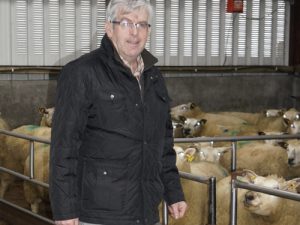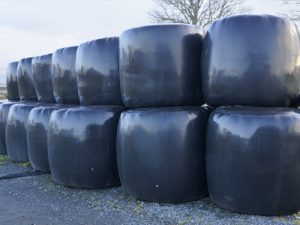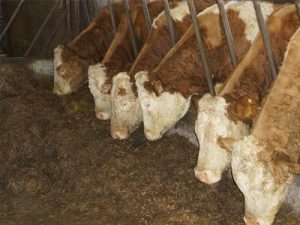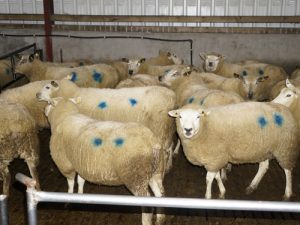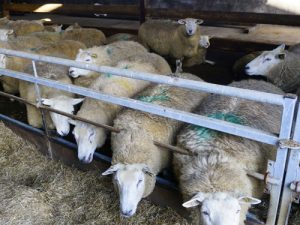Producer groups in Ireland typically operate in the areas of beef and lamb production, however, there are also some prominent in wood production. Farmers involved in lamb and beef producer groups typically engage in contracts with one or more meat processors regarding the purchase of their produce. Processors are therefore quoting for large numbers of stock and farmers have greater leverage over price. Some producer groups also operate with regard to produce of one specific livestock breed. While others are also focused on improving the quality of livestock and breeding. The essential to a successful group is a good structure, commitment and trust of the members. In some groups, lambs or cattle are assembled in a central location and then transported to the factory. It provides conven- ience to the farmer without compromising on price. Some producer groups also engage in group purchasing of farm inputs.
The insights into the Sligo Leitrim Lamb Producer Group (SLLPG) were provided by Mr James Costello who is Chair- man of the group. James runs a flock of 150 ewes and a pedigree Simmental Suckler Herd of 40 cows. All lambs and sheep on the farm are sold through the SLLPG.
Basic information
Cooperation Process Data
The SLLPG involves 90 members who are involved in lamb production in counties Sligo and Leitrim in Northwest Ireland. The SLLPG commenced in 2009 and has a contract to supply lambs to Irish Country Meats. Navan (typically a distance of 120-180 kms from the farms).
Prior to the operation of the SLLPG, all farmers negotiated their own price for lambs with the meat processor and organised the transporting of lambs to the processor themselves.
Historically there was a Lamb Producer Group in operation in this area but it ceased mainly due to a lack of commit- ment from farmers and an unwillingness to get engaged in voluntary roles in the producer group.
In 2008, a number of sheep farmers supported by their Teagasc advisor initiated the process of setting up the current producer group. The Teagasc advisor put in significant effort in encouraging sheep farmers in the area to consider the involvement in a Producer Group. The SLLPG was established and a contract agreed with Irish Country Meats in Navan, Co. Meath. The first lambs were sold through the SLLPG in 2009 from the farms of 112 farmers. The number of active members is now 90 farmers.
The SLLPG is farmer run and managed by a voluntary committee. The committee is elected by the farmer members. The local Teagasc advisor acts as secretary to the SLLPG. Farmers apply to be members of the SLLPG and pay a once-off membership fee of €100. Members commit to adhere to the terms and conditions of the group. Some of the key rules include:
- Booking is done through the group coordinator;
- Commit to sell their lambs through the group;
- Meet the quality specifications agreed by the committee;
- Conform to quality assurance schemes as agreed; and
- Comply with rules regarding medicines.
Farmers pay a commission fee (which is collected by the meat processor) of €1 per lamb sold to cover the operation and running costs of the group. The meat processor contributes €0.25 cent per lamb towards the functioning of the group. The meat processor also covers the cost of transport from the farm to the abattoir. The price paid for lambs based on the top two price quotes for lambs published in the National Farming Newspapers (the Irish Farmers Jour- nal) every week. There is also a bonus payment of 20-25 cents/kg for achieving certain grades. In order to achieve the bonus payments and meet the processor requirements farmers regularly weigh their lambs and closely monitor growth and performance.
The SLLPG has an annual general meeting every year where members have an opportunity to review the activities and also there is an annual review meeting with the meat processor.
The SLLPG employs a part-time coordinator who farmers contact every Friday to book in their lambs for sale on the following week. The coordinator contacts the meat processor and follows up with farmers on any specific issues. Lambs are typically collected every Monday morning. Farmers bring their lambs to one of four collection points across the region. The lorry driver is paid by the SLLPG to sort the lambs into each farmers group when they arrive at the meat processor so farmers do not need to travel to the meat processor. Each farmer receives their payment directly from the meat processor.
In addition to coordinating the sale of lambs, the SLLPG also organises information events and activities for the benefit of members. On-farm demonstrations and information meetings/seminars have been held to demonstrate to farmers the specific requirements of the meat processor and also to provide practical information and guidance on key issues relating to lamb production, performance, health and welfare. Speakers at these events have included: Teagasc; University Veterinary Experts; Representatives from the Meat Processor; Representatives from Animal Health Companies; Vets; and other farmers. These events have helped to inform members on the meat processor requirements but also ways of improving management, husbandry and performance. The SLLPG has also engaged with University College Dublin in monitoring of lambs for resistance to anthelmintics.
“Farmers learned a lot from the events organised and the quality of lambs improved as a result”
Members of the SLLPG are also now participating in a number of sheep discussion/knowledge transfer groups which have developed since the producer group started.
Approximately 12,000 lambs are killed through the producer group every year.
The benefits of the being a member of the SLLPG include:
- Farmers are guaranteed a quote for their lambs which is representative of the top quotes available in the market on that week;
- Farmers are guaranteed a weekly outlet for their lambs;
- Farmers do not have to waste time travelling a long distance to their meat processor and waiting for their lambs to be accepted for killing;
- Meat processor provides insights into the consumer demands and changing trends;
- Meat processor provides guidance and advice to farmers on meeting their requirements and achieving bonus payments;
- The quality and weight of lambs has improved since the group began and farmers are now delivering lambs of con- sistent weight and quality to the meat processor and achieving better kill out percentages and bonus payments;
- As the lambs are collected centrally, farmers can sell small numbers weekly (if they wish) which would not justify them making a trip to the meat processor themselves;
- Farmers have had the opportunity to receive information and advice from industry experts;
- Discussion/knowledge transfer groups have developed from the producer group members;
- Members have benefited from discounts on purchases of certain inputs such as sheep tags; and
- Very positive relationship has developed with the meat processor.
‘In the past farmers would join a queue with their lambs, not know how long they would have to wait. They wasted a few hours waiting around at the meat processor. The producer group eliminates this’
‘Farmers feel that they are getting a good price and are not taken for granted’
There are also benefits for the meat processor from engaging with the SLLPG including:
- Regular supply of lambs;
- Greater proportion of lambs meeting the meat processor requirements; and
- Opportunity to engage directly with farmers on their requirements.
Overall since the group was started in the 2009, it has operated well and no experienced any significant threats or challenges. Some farmers have joined the group and left or did not adhere to group rules but the number of members has stabilised at 90 farmers with a throughput of an average of 12,000 lambs per year. However, all producer groups face the potential threat of members leaving the group and disintegration of the group.
Some of the farmers involved in this group were involved in the previous group in the past so they were well aware of the importance of encouraging loyalty to the group and commitment to support the group in voluntary tasks.
The group has a set of guidelines for members so the rules of membership are clear to farmers at the time of signing up to the group. However, the group could be potentially threatened if farmers do not adhere to the guidelines and requirements of the meat processor.
Producer groups are dependent on the volunteerism of members, one of the reasons for the failure of the previous group was a lack of willingness to get involved in the running of the group. It remains a challenge to this group to get members involved in the committee and running of the group. However, the group is successfully using its financial resources to pay for the part-time coordinator and lorry driver to sort sheep in the meat processor. Therefore, the group is minimising the need for volunteers to commit to the day-to-day running of the group.
‘The group will not succeed if there is a lack of commitment or unwillingness of farmers to take on voluntary roles’
Farmers by nature are traders and like to negotiate for the highest price. There is a risk at times that some farmers may feel that they can get a better price outside the group. The group has attempted to address this issue by agree- ing to a pricing mechanism based on the prevailing market in Ireland.
The dependence on one purchaser for stock could potentially pose a threat if there was a problem or issue with that meat processor but to date this relationship has worked well.
The Teagasc advisor has been a key driver of the SLLPG and if he was not as involved the group might not have been as successful.
Overall, the chairman is very satisfied with the operation of the SLLPG for a number of reasons: it is delivering a good price to farmers; it is saving on time for farmers; farmers have improved their stock as a result of their involvement; and they have built up a good relationship with the meat processor. However, he believes that farmers can continue to make improvements and they could benefit from greater feedback from the meat processor. There is an oppor- tunity to review process every year at the group annual general meeting and at the annual review meeting with the meat processor.
Members of the SLLPG did not engage in any formal training however, the majority of farmers did participate in the informal information events and activities which were delivered by way of: on-farm demonstrations; meat-processor visits; sharing of knowledge; meetings/seminars; and external experts.
These events built the knowledge and awareness of the members on the meat processor and market requirements and ultimately resulted in farmers producing lambs more suited to the market and achieving bonus payments as a result. The shared learned has benefited all members.
A number of the members progressed into joining specific Knowledge Transfer Discussion Groups facilitated by Teagasc and supported under the Rural Development Programme. These KT groups meet a minimum of 5 times per year and focus on: Animal Health & Management ; Profitability & Financial Management; Grassland Management; Breeding; Health & Safety; and Environmental Sustainability.
Advice/Recommendation
Based on the experience of the Sligo Leitrim Lamb Producers Group, some of the practical suggestions for other farmers considering setting up a producer group include:
- Seek full commitment and loyalty of farmers to the group;
- Ensure the rules and guidelines are enforced;
- Seek voluntary input from farmers to assist in the running of the group but strive to employ someone to coordi- nate the booking of lambs and organisation of transport;
- Seek and utilise the support of Teagasc;
- Build linkages with other relevant organisations and stakeholders who can provide support and insights;
- Build the relationship with the meat processor;
- Engage with an utilise the expertise of the meat processor to educate and inform farmers on requirements;
- Clearly explain price setting and processor requirements to farmers; and
- Consider on-farm events to inform farmers on requirement and best practice.
Growth: "Adapt a bottom up local led approach to manageable sustainable growth – start with a few farms and allow for steady growth ensuring maintenance of best practice and ongoing training provided that suits the needs of farmers" "Ongoing consultation with farmers and participants is crucial insofar as dedicated coordinator(s) are required."
Queries/Questions
- Would farmers be willing to commit to and be loyal to a group?
- Could a positive relationship be developed between farmers and a meat processor?
- Is there any support available to assist in setting up a producer group?



 Čeština
Čeština  English
English  Français
Français  Deutsch
Deutsch  Italiano
Italiano  Slovenščina
Slovenščina  Español
Español 